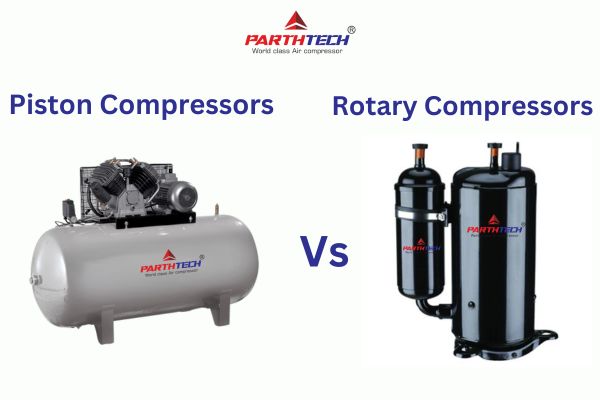-
Call
-
Whatsapp
9825014048
-
Location


Blog


BLOG

Comparing piston compressors vs. Rotary compressors: Pros and Cons
Compressed air is vital in various industrial and commercial applications, ranging from manufacturing processes to powering pneumatic tools. When selecting a compressor for your specific needs, two standard options are piston and rotary compressors. Each type has advantages and disadvantages, making it crucial to understand their differences before deciding.
In order to assist you in making an educated selection, this article will compare and contrast rotary and piston compressors.

Piston Compressors:
Pros:
1. Cost-effectiveness:
Piston compressors are generally more affordable upfront, making them a preferred choice for small businesses or those on a tight budget.
2. Durability:
These compressors are known for their robust construction and durability; with proper maintenance, piston compressors can have a long lifespan.
3. Suitable for Intermittent Use:
compressors are well-suited for applications with intermittent usage, where they can start and stop without causing significant wear and tear.
Cons:
1. High Noise Levels:
Piston compressors produce more noise than rotary compressors, which may be a concern in noise-sensitive environments.
2. Higher maintenance Requirements:
Regular maintenance, including oil changes and inspections, is essential for piston compressors to ensure optimal performance and prevent breakdowns.
3. Limited Capacity:
Piston compressors are generally better suited for lower-capacity applications, and their efficiency may decrease in larger-scale operations.
Rotary Compressors:
Pros:
1. Energy Efficient:
compressors are known for their energy efficiency, providing a constant and smooth airflow. They are particularly effective in high-demand applications.
2. Compact Design:
These compressors are great for installations when square footage is at a premium because of their diminutive size and footprint.
3. Low vibration:
compressors produce less vibration and noise than piston compressors, contributing to a quieter and more comfortable working environment.
Cons:
1. Higher Initial Cost:
Rotary compressors typically have a higher initial investment, which may be a deterrent for small businesses or those with budget constraints.
2. Complex Maintenance:
While rotary compressors have lower maintenance requirements, any repairs can be more complex and may require specialized technicians.
3. Not ideal for intermittent use:
Rotary compressors are designed for continuous operation, and frequent start-stop cycles can impact their efficiency and longevity.
Conclusion:
In conclusion, the choice between piston compressors and rotary compressors depends on your application's specific needs and requirements. A piston compressor might be the right choice if you prioritize affordability and durability for intermittent use. On the other hand, if energy efficiency, low noise levels, and continuous operation are crucial factors, a rotary compressor may be more suitable. Consider your budget, space limitations, and the nature of your operations; keep your chosen compressor running smoothly and efficiently for as long as possible, and routine maintenance should always be your top priority.


FAQs

Frequently Ask Questions
Piston compressors use reciprocating motion, while rotary compressors operate through continuous rotary motion. The key distinctions lie in design, efficiency, and performance characteristics.
Piston compressors are generally more budget-friendly initially, making them a popular choice for small businesses or those with limited capital.
Rotary compressors are known for their energy efficiency, providing a constant and smooth airflow. They are particularly effective in high-demand applications.
Piston compressors have higher maintenance requirements, including regular oil changes and inspections. For maximum performance and durability, regular maintenance is essential.
Rotary compressors produce less noise and vibration than piston compressors, contributing to a quieter and more comfortable working environment.
Piston compressors are well-suited for applications with intermittent usage, where they can start and stop without causing significant wear and tear.
Rotary compressors often have a more compact design and smaller footprint, making them ideal for installations with limited space.
Yes, rotary compressors are designed for continuous operation and are more suitable for applications with a constant demand for compressed air.
Rotary compressors are generally preferred in large-scale operations due to their higher capacity and energy efficiency.
Consider your budget, space limitations, the nature of your operations, and the demand for compressed air. Regular maintenance is essential to keep your chosen compressor running efficiently and for a long time.
